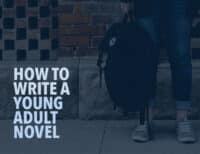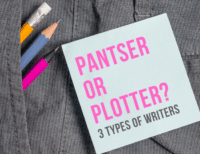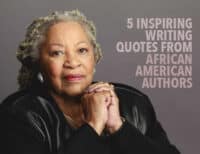How many times do you edit your novel? I've asked several people this question and gotten varied results: three times, seven time, ten times. Some even edit as they write.
Personally, I edit my novel five times using what I call, “The Five-Draft Plan,” I get good results. Every time. What is “The Five-Draft Plan?” Read on and you shall see.
Building Your Statue
Think of “The Five-Draft Plan” as building a statue. The statue is your story, and you want to perfect it before putting it up for display.
1. First Draft
Write. Just write. Don't think, don't plan, don't outline, just write. The more thinking you do, the slower the writing process gets.
Chances are you barely have time to write in the first place. Write without thinking about the editing you'll have to do later. Don't go back and definitely don't edit. Resist the urge to tweak!
Your statue isn't even a statue yet. You're just pouring a big block of cement. Don't worry about the fine details yet. If you need to warm-up before the no-thinking process begins, try some free writing.
2. The Second Draft
This is your first big edit. Your block of cement is waiting. Take the first big swing with your hammer and chisel away. This is your chance to fix any major plot holes or character development issues. Find and fix any big mistakes you see.
Once you've gone through your whole novel, you'll be ready to move on to the third draft.
3. The Third Draft
This is where the editing gets fun.
Is your statue beginning to take shape? Can you make out a design yet? It's time to work on some details. Take a look at your word choice and your sentence structures. Do some line-by-line edits to really make your manuscript sparkle. Y
our story should start to flow together nicely.
4. The Fourth Draft
Oops! You've missed a few spots on your statue. Spelling and grammar mistakes might not be the most fun things to fix, but it's necessary that you proofread your novel.
Have you ever come across mistakes such as these in books that you've read? I have. When I see one, I cringe. You don't want your readers to cringe while reading your book.
Spellcheck is your friend.
5. The Fifth Draft
You're almost done! Your hard work is about to pay off! But hold up on the victory dance. It's time to ship your statue off to be perfected.
Send your novel to your critique partners and few close and trusted friends. Have them send you their edits and change what needs to be changed.
Remember, you don't have to listen to everything they say, but always consider everything thoughtfully and take their advice whenever necessary.
Your novel should be as close to perfect as you can get it to be by now. That wasn't too hard, was it? Now you get to write your query letter and start looking for agents! (Yay)!
How many drafts do you use when you edit?
PRACTICE
Let's practice using “The Five-Draft Plan” in our writing. Write a short story or poem for fifteen minutes. When your time is up, use “The Five-Draft Plan” to edit your work. Post your Practice in the comments and give your fellow writers some feedback.
Have fun!








This is roughly what I do, but after #2 the lines between the drafts get blurred. For the first draft, I just write, get it all out, get it finished and on paper (virtual paper anyway). For the second, I start over more slowly, sometimes rewriting everything sometimes pulling the bits that work out of #1 and pasting them in. After that, it’s pass after pass of tweaking, rearranging, adding/deleting bits, and finally polishing. But whether any of those passes constitutes a draft is hard to say.
Elwyne… I agree, who’s counting the drafts? Although, I claim it took me 16 drafts to get “Roxy” to a publishable state. Mind you, by that time I was working with the publisher’s editor, and she had a lot of good ideas, plus she was a woman and so was my young protagonist, and since I’m not, and never have been pregnant… yikes!… I needed all those drafts. And with every draft, the weave of the story got tighter, the subplots became more significant, and unnecessary characters got the heave-ho. The more drafts I wrote, the more fun the writing became. I personally don’t think it’s possible to produce a work of significance without these many many drafts… unless you’re some kind of genius, which I’m not. But I do like to write. As poet Charles Bukowski says: “Do it, do it, do it / all the way, all the way… it’s the only good fight there is.”
Those sixteen edits were time well spent. I enjoyed “Roxy”.
My editing used to vary all the time. Even after five drafts I’ll go back and notice one thing I missed, but those things are extremely minor and sometimes not even worth it. I say do whatever works best for you! My advice is only ever a suggestion.
Sometimes, but not often, your first draft needs very little improvement. I read immediately after editing, and edit again.And again. It keeps the momentum going. Even before I send something off I find I still have to edit. (Perhaps its the urgency of a deadline that focuses the mind?).
A lot of times I work the story or article over in my mind so well ahead of time that when I finally sit down at the keyboard, it just spills out. Like the story I posted above. The editing is mostly correcting typos — I’m an AWFUL typist.
My main hurdle is in giving myself permission and/or ordering myself to sit down and write that story now. I feel I should wait until I have “enough time” — that rare occurence.
Spellcheck is your friend.
Yes – to a degree – but it can be a fair weather friend. It won’t alert you if you have talked about the souls of somebody’s feet, or had your hero fear that there was too much at steak. [Yup, guilty of both when trying to write with a migraine.]
Your BEST friend is a trusted proofreader and it can’t be yourself. Why not? Because you read what you expect to see and will therefore skim over typos etc.
Agreed. One of my characters is named “Chris” but apparently “Christ” showed up a fair few times.
That’s a fantastic comparison!
I’m working harder at being less crazy with the first draft and expecting perfection, but it’s so hard not to edit!
It’s taken me YEARS to learn not to go back and edit (and I’m constantly tweaking before I catch myself doing it). Little by little it’ll get better. 🙂
The Devil’s Dog (An Allegory)
The boy stood at the corner of the curb scuffing his toe on the cement, bored and lonely. He was just into his teens, his whole life was ahead of him, but it looked so bleak that day. Not a person in the world cared about him, it seemed.
Suddenly this huge car roared up beside him and stopped. The coolest, friendliest guy called out through the open window, “Hey kid. You look bored. Wanna ride along with me? I can take you places where you’ll have great times. No point standing here in Dullsville all your life. Hop in.”
The boy opened the door, but drew back in horror when he saw a vicious-looking dog in the back seat, licking his chops as if he was ready to devour anyone who got in that car.
“You scared of my dog, kid? Don’t be. He’s a real pussycat.” The man reached back to ruffle the dog’s ears. “I have complete control of him. I promise he won’t hurt you as long as I’m around.”
Still the boy hesitated, for hadn’t he seen that very dog chewing on some bones in the school yard one day? People bones.”
“Get in, son. I can show you terrific times. As long as you’re willing to do your part, we can see sights you’ve never seen before, party like you’ve never partied before. You’ll find lots of friends in my crowd, too. They’ll welcome you with open arms. You don’t have to stand there all alone. Come on and have some fun. And don’t worry about my dog.; he’s just here to protect me. I’ll look after him.”
The boy wavered, fearful, but tempted. Right now the future held nothing more promising for him; his life had really hit the pits. So he climbed in, shuddering as he felt the dog’s hot breath on the back of his neck. The car sped off.
The man wasn’t lying; the trip was thrilling. He loved the stream of air rushing over his skin, the burst of speed rushing through his veins. The world looked brilliant now, as if he were seeing everything with brand new eyes. His social life was wild; his new friend introduced him to a fun crowd. They all flew around in that awesome machine – and the dog sat peacefully in the back seat.
Then one day the car sputtered to a stop. “Outta gas,” the man said. “Guess we’re outta money, too. Now, kid, you have to do your part.”
The boy shot a curious glance at his companion. “My part?”
“See that store over there?” The man pointed to a little grocery store. “Go ask them for some cash.”
“Yeah, right. Like their going to hand over a wad of twenties to some kid who walks in.”
“Take this,” the man told him, handing over a handgun. “You don’t have to hurt anybody. Just wave it around, look like you mean business and they’ll give you what you ask for.”
The kid’s jaw dropped. “You want me to ROB the store? I’ll land up in jail.”
“No you won’t. I’ll cover for you out here and delay the cops so you can get away. Or if you’re really chicken, wait until after dark and crawl in a window. Then you can help yourself, but it’s quicker this way.”
“But…” the boy sputtered.
“Look, kid. We’re out of gas. We need some cash – and you agreed to do your part, remember.”
The boy was about to say something, but right then the dog growled and started gnawing on his shoulder. The boy grabbed the gun was out of the car in a flash. He rammed the pistol into his pocket, but his hands shook something awful as he headed into the store.
To be continued…
I’ve been wanting to write this for a long time. Today’s practice gave me the push I needed to start.:)
this was really scary, Christine – I kept hoping he wouldn’t get in the car – nice job using the dog!
Thank you. This is about half of the total story — it’s amazing I could do that much in fifteen minutes (when I’ve been putting off writing it for so long because I didn’t have the time!)
I tried, but I can’t write without correcting. Just knowing there are mistakes is a distraction and breaks my concentration. It’s like having splotches of mud on your counter when you’re trying to make supper.
You tell the story very well.
Thank you. Now that I’ve started, I hope to post the whole story on my blog soon.
I couldn’t agree more. It’s tough. Don’t know if this will help you, but it’s a technique I started using. Assuming you don’t mean spelling errors, mark a mistake or something you don’t like with a * and move forward. Then when you edit, go back and fix all the *. Sometimes it turns out it wasn’t that big of a deal after all!
Loved this! That dog is creepy. I need to know what happens next! 🙂
Since I have you hooked, I’ll post this story on my blog–but be warned. It gets worse. Look for the first post Thursday, July 25th at christineevelynvance.wordpress.com
Call me a control freak, but I edit as I go along! I’m like the racehorse who trembles to get out the gate – I have to have a strong
beginning whether for a short story or book and I rewrite that first sentence or
few sentences countless times before it feels like a winner – it helps drive the
story for me. In my book that was released last fall, I rewrote the
epilogue(it’s non fiction) about 15 times before I knew it was the one. And
to be honest even after the book was printed, each time I read one of the short
stories, I see ways to improve them and things I wished I omitted, sigh…I think
that’s the life of a writer. Letting go…
I REALLY only had 15 minutes to write the practice so instead of a
whole scene, I wrote and edited one sentence using those stages. I had no idea where this came from, just popped up when I began to type.. I guess stage
5 is my post here!
1. The first time Julia noticed something was wrong was when she was at the
grocery store and realized she was wearing her pants inside out.
2. Julia was in the grocery store bathroom the first time she noticed
something was wrong. Her pants were inside out.
3. Julia was squeezing avocados at Benny’s Market the first time she
realized something was wrong. A blackened overly ripe avocado rolled off the
counter and plopped on the floor and when she bent over to pick it up, she was
horrified to see the inside hem of her trousers. She had been wearing her
pants inside out.
4. If it wasn’t for the wayward avocado, Julia might still be wearing her
pants inside out.
The last sentence says it all!
Re those five stages: I find I over-edit and leave only a skeleton behind. What about having a time break in there somewhere?
thx, Winnie – not sure whether I like the last one or 33 best. I like the picture in #3 but #4 sets up a story…am curious. Has someone told you that what you leave behind is a skeleton or is that your perception after you have sliced and diced?
This is thankfully a thing of the past. After I’d finished on the chopping board and reread it after a time break I found I’d lost the essence of the story. I think this came from piecemeal editing, that is rewriting without first reading it through, sans the inner editor, to get the feel of what I was trying to say.
Now that’s interesting. They must have been pull-on; trying to do up a zipper inside out would have frazzled her before she got out of her bedroom. 🙂
I don’t know if I’m a control freak, but my mind sort of “bookmarks” errors. If I know I just spelled something wrong in a sentence, my mind wants to mark that spot as a “go back and fix.” If I get lots of spots marked, I feel before long the whole story’s a mess; I can’t think “action forward” until I’ve gone back and cleaned them up. The major edits I can often leave until later.
I think I will always edit as I go along – I wish it was different but it’s just the way the process works for me. Those dang red and green underlines for errors are like neon flashing lights and they are just too distracting! HOWEVER. I also journal. And it’s in my journaling with pen and notebook that I write with freedom. As I’m ranting or praying or emoting with all my heart, some of my best ideas and story lines show up…
Back to those pants again… A friend told me about her mother, a minister’s wife and busy mom, always bustling, doing up buttons as she rushed out them out the door. It was especially hectic on Sunday mornings, trying to get everyone to church.
The church was huge, a large congregation. One morning as she shepherded her flock of children up toward the front, she suddenly stopped, whirled around, and rushed out. She’d realized she had her dress on inside out.
hahahaaa – a woman in front of me at church a few weeks ago had her top on inside out – I could read the washing instructions on the tag!
Nowadays you hardly can tell if it’s due to not paying attention or to fashion. 😉
I like to use the basic Notebook program that comes standard on most computers. No annoying squigglies, just a big blank space. The bonus is that I can quickly copy/paste the whole thing into word or Scrivener when I’m ready to edit.
Ooh, that’s a great idea! I’m always distracted by the squiggles when I write something wrong, and then my flow is all messed up.
I always try to journal first. I have issues moving forward with broken things. A lot of my inspiration lies with what I’ve already written. When the hand of your statue looks like a hand, you want to move on to the forearm.
Yet, I love danglies and don’t get rid of them. For example, I added a dress in chapter two of my novel. I didn’t have any use for it, and thought I would just end up getting rid of it. Having it as a problem in my subconscious, finally it worked out as an important element.
I detest the idea of writing the whole novel and editing the whole novel. I would get about halfway through the second draft and pitch the rest because something important changed.
Nice job! 😀 I love seeing how the sentence has changed with all of your edits. Personally, I liked the first and last ones best, though the first one is a little long. I want to know why she wore her pants inside out!
Interesting – I love the metaphor of a story as a statue. Comparing art forms can be so helpful, especially when we’re stuck in our process.
This approach may be a gold mine for some, but for me it actually sounds terrifying. I’m about 225 pages into a first draft and I’ve already had to stop, change things, and then move on several times (plus I just realized that most of what I’ve written is back-story that won’t make it into the final version).
Anyway, I call it the “snow-ball” method. Thankfully there are several ways to move through this process and you’re article does a great job of identifying the levels of revision we need to work through.
And by the way, why are you an “aspiring” author? You just wrote a blog post…. what else have you already “authored”? Claim that work like a boss!
Thanks for commenting! 😀 I’ve had the statue idea for a long time, but just never got around to it.
Ha, I guess that would make me an author. 😉
“You have no new messages.” That was the answer Harris got from his phone. But he knew that couldn’t be the case.
“He called. The boss man called. I know he left the instructions!” Harris Jeffries was getting desperate. Time was running thin on his assignment and if it wasn’t finished, he would be. He didn’t have time to waste on a junk cellphone.
“Aww, just check it again in a lil’ bit Jeffy.”
“Shut up! Shut up, Bones you old bum!” Harris hated his partner, pretty much in general, but he really hated being called “Jeffy”. The “devil may care attitude” didn’t help, either.
“It’s my life on the line, here pal, and if I can’t find the target you’ll do nicely.” Cold words for cold actions, but the tension was getting pretty thick. Harris could feel his heart- it was about to leap out of his chest he was so worried about this job.
“Yeah, calm down. Too bad you can’t call him…but then again that would sorta give away a buncha info on boss man.”
Harris rolled his eyes. “Why?” he thought. “Why do I have to be stuck in this alley, next to this big, stinking oaf?”
The dilapidated cell phone lit up. It didnt register on caller ID.
“This is it!” came a hushed but excited whisper.
Good start. What happens next?!
Thanks! I wish I could tell you. I just started writing and that’s what came out. I’m going to have to do some more exploring on this one.
… You’re ending there?!?! Way to torture a person! 😉
Great start! 🙂 The characters already have a ton of personality. I need to know what happens next!
When i started writing my story, the book was nothing like it is now. The editing process has really taught me a great deal about writing my story
It’s amazing how much editing can transform your old story into something completely new, isn’t it?
@ Helen – “Because you read what you expect to see and will therefore skim over typos etc.”
I’ve noticed this for myself, as well. I often need a second set of eyes to look at my paper, to be sure that I have not spelled something wrong, inserted an extra word, or left one out. My proof-readers usually catch it, and I explain to them (somewhat abashedly) that as a reader of my own work, I already know what I want on the page and so I read the material internally fixing the mistakes. I find that reading aloud also helps this, but would definitely advise having an outside source check for basic errors.
I usually do three drafts on my own, and the final fourth is for a few select others to look over for me. My process is much like the one you outlined above … the difference for me is that I normally pair up #3 and 4. Thanks so much – I love reading your stuff!!
Thanks! 😀 I can’t think of anything more helpful than having a friend look over your work. After a while you start to read the same sentence over and over again. (That’s when I know I need a break).
This is not really related to the article at all but rather … something else… literally every single article posted is important and relevant and thats kind of amazing. thats really amazing. that’s really great. amazing job!
Hello!
I’m working on a high fantasy novel and I’m writing the first draft. SOME people say that it’s necessary to outline before 1st draft. You say different. So…what advice should I follow? And why?
I’m on my second draft but it’s a completely different story from my first one so now I have to go back and check for character and plot holes. I already plan on changing it. I do not start editing grammar and punctuation solely until I know for sure who I want the main characters and villains to be!